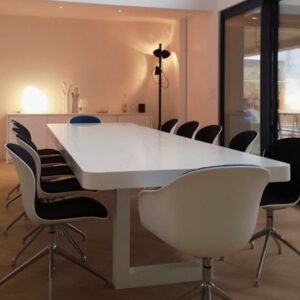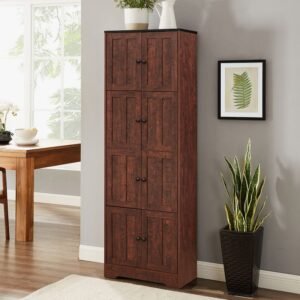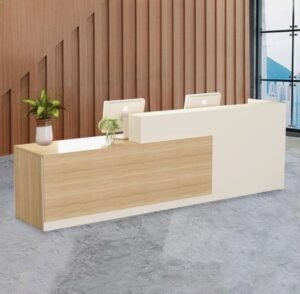When visitors or clients walk into your office for the first time, the reception area becomes their initial point of contact. One of the most prominent pieces of furniture that defines this space is the Reception Table. It is not just a workstation for receptionists—it is a symbol of professionalism, branding, and workplace culture. Choosing the right table sets the tone for the entire office, leaving a lasting impression on guests and ensuring efficient functionality for front-desk staff. A reception table needs to combine both aesthetics and utility, offering ample workspace while maintaining a sleek and welcoming appearance. From modern to traditional styles, the options available today make it easy to find a piece that suits your office theme, no matter the industry. Companies in corporate, hospitality, healthcare, and education sectors have recognized how important a table is in conveying the values and atmosphere of their workplace.
Key Features to Consider in a Reception Table
Selecting the ideal Reception Table involves more than picking out a design that looks good. It must be functional, ergonomic, and durable enough to withstand daily use. When browsing options, consider the size of your reception area and the type of operations that happen at the front desk. A table should have adequate surface space for a computer, phone systems, visitor logbooks, and promotional materials, while also offering privacy panels or modesty panels for the receptionist. Cable management systems are another vital feature to keep the area tidy and safe. Storage compartments, drawers, or attached cabinets can make it easier for receptionists to manage documents and supplies. A table with an ergonomic design ensures comfort for staff during long hours of work. Materials such as laminated wood, MDF, metal, or even glass can also influence the table’s longevity and maintenance needs.
Reception Table Designs That Impress
Today’s Reception Table designs range from minimalist to luxurious, allowing businesses to align their furniture choices with their brand identity. A sleek, curved desk with a glossy white finish can be the perfect fit for a modern tech startup, while a rich wood veneer table with intricate detailing might suit a law firm or financial institution. Custom-made reception tables offer the flexibility to incorporate corporate branding, such as logos or signature color accents. LED lighting, glass countertops, or layered panel designs can add a unique and futuristic feel. U-shaped or L-shaped reception desks are ideal for larger spaces and high-volume visitor traffic. Smaller offices can benefit from compact, space-saving designs that still maintain an elegant appeal. When choosing a reception table, always think about the experience you want to offer to both visitors and your reception staff.
Benefits of Investing in a Quality Reception Table
The advantages of installing a high-quality Reception Table go far beyond visual appeal. It enhances the efficiency and comfort of the reception staff, allowing them to perform tasks such as greeting guests, handling phone calls, and scheduling appointments without physical strain or clutter. A good table improves workflow, facilitates better organization, and helps keep sensitive documents safe with lockable drawers and concealed compartments. From a visitor’s perspective, a well-designed table adds to the ambiance of professionalism. It reassures clients that they are entering a well-managed and trustworthy business environment. Moreover, well-crafted reception tables are built to last, offering excellent return on investment by minimizing repair or replacement costs. In today’s competitive world, where every detail matters, a table can become a subtle but powerful tool in enhancing your brand image and customer perception.
Matching the Reception Table to Your Office Décor
A well-integrated Reception Table can complement and elevate the overall aesthetics of your office. When planning your reception area, think about how the table blends with the flooring, walls, seating, lighting, and decorative elements. For contemporary spaces, go for streamlined designs in neutral or monochromatic tones, perhaps incorporating glass or chrome. In contrast, traditional offices might benefit from deeper tones, wood grains, or vintage carvings. Interior designers often recommend accenting the table with elements like indoor plants, table lamps, or digital signage to add more dimension and functionality. Whether you want a design that’s subtle and blends in, or a centerpiece that commands attention, the table can be the focal point around which your entire front-office décor is arranged. Matching your reception furniture with branding themes also helps reinforce consistency and professionalism.
Reception Table for Different Business Needs
Different industries have different requirements when it comes to Reception Table features. For instance, in a medical clinic, a reception desk must have patient privacy panels and possibly a partitioned window. In hotels, reception tables are typically larger and more decorative, with extra space for managing keys, check-in systems, and guest inquiries. Retail outlets might need a table with point-of-sale terminals and promotional display zones. Educational institutions may favor sturdy tables with student-friendly heights and lockable storage. Meanwhile, co-working spaces often prefer modular or mobile reception desks that can be rearranged based on changing needs. Understanding your specific industry requirements ensures you select a table that’s not only beautiful but also operationally efficient.
Custom vs Ready-Made Reception Table Options
When sourcing a Reception Table, you have the option of choosing a ready-made model or going for a custom-built one. Ready-made tables are cost-effective and readily available, often coming in standard sizes and finishes that suit a wide variety of office types. However, for companies looking to stand out or who have unique space requirements, custom reception tables offer more flexibility. You can work with a designer or furniture manufacturer to specify materials, dimensions, colors, branding elements, and storage configurations. Though custom options may take more time and investment, they result in a one-of-a-kind centerpiece that reflects your brand identity and enhances overall efficiency. Ultimately, the choice depends on budget, time frame, and how specific your needs are.
Conclusion: Choose the Right Reception Table for Long-Term Value
Investing in a well-designed and durable Reception Table is a smart decision for any business that prioritizes first impressions and operational excellence. It not only boosts staff productivity but also contributes to customer satisfaction and brand identity. Whether you opt for a modern, minimalistic look or a classic, custom-built piece, the right reception table can transform your front office into a space that reflects your professionalism and attention to detail. Make sure to consider space, ergonomics, material quality, and visual appeal before making a purchase. A reception area that welcomes clients with style and efficiency starts with the right table—and choosing one can be a cornerstone in enhancing your workplace image.






